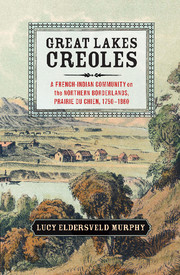 Great Lakes Creoles
Great Lakes Creoles Book contents
- Frontmatter
- Dedication
- Contents
- List of Tables
- List of Figures
- Acknowledgments
- Introduction
- 1 “The Rightful Owners of the Soil”
- 2 “To Intermeddle in Political Affairs”
- 3 “Damned Yankee Court and Jury”
- 4 Public Mothers
- 5 “A Humble … People”
- 6 Blanket Claims and Family Clusters
- Conclusion
- Epilogue
- Index
- References
1 - “The Rightful Owners of the Soil”
Colonization and Land
Published online by Cambridge University Press: 05 September 2014
- Frontmatter
- Dedication
- Contents
- List of Tables
- List of Figures
- Acknowledgments
- Introduction
- 1 “The Rightful Owners of the Soil”
- 2 “To Intermeddle in Political Affairs”
- 3 “Damned Yankee Court and Jury”
- 4 Public Mothers
- 5 “A Humble … People”
- 6 Blanket Claims and Family Clusters
- Conclusion
- Epilogue
- Index
- References
Summary
In 1781 Michel Brisbois watched a colorful ceremony take place at Mackinac Island situated between the upper and lower Michigan peninsulas. The twenty-two-year-old fur-trade clerk from Maska near Montreal looked on as British Governor Patrick Sinclair presided over a council in which Meskwaki leaders formally approved the multi-ethnic commercial center 500 miles away at Prairie du Chien and confirmed the community’s right to occupy nine square miles of ground located just north of the junction of the Wisconsin and Mississippi rivers. Representing the Prairie’s Creole residents, three French Canadian fur traders thanked the Meskwakis and gave them numerous trade goods in payment.
Brisbois was surely paying close attention and understood the layered realities evident as the council proceeded. This ceremony affirmed (as Prairie du Chien residents would later explain) that the Meskwakis were the “rightful owners of the soil,” but also recognized that they had been colonized by the French, who in turn had lost a war with the British. Thus the three French Canadian representatives tacitly acknowledged the hegemony of the British while gaining the public permission of the Meskwakis, preferring the British over the United States as the Revolutionary War inflamed the tense Ohio country to the east. And Sinclair’s participation meant that the British government had no objection to the existence of this Creole fur-trade town. However, the British control over the upper Mississippi Valley was weak at best. The ceremony took place at Mackinac Island rather than at Prairie du Chien because British officials generally avoided the region west of Green Bay due to Native hostility.
- Type
- Chapter
- Information
- Great Lakes CreolesA French-Indian Community on the Northern Borderlands, Prairie du Chien, 1750–1860, pp. 24 - 64Publisher: Cambridge University PressPrint publication year: 2014
